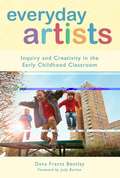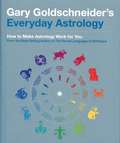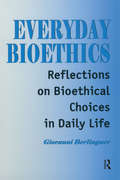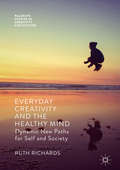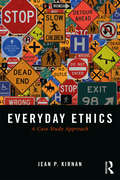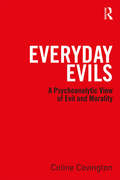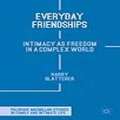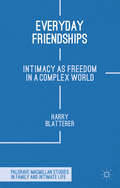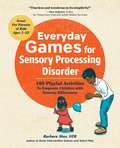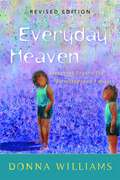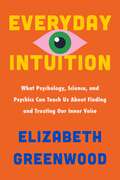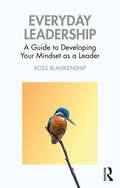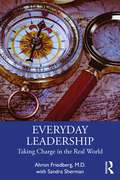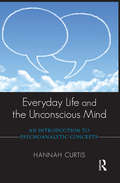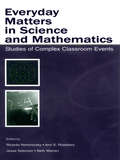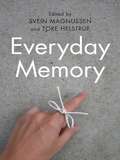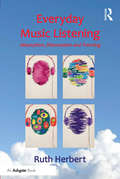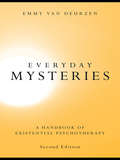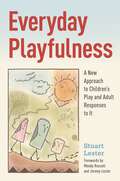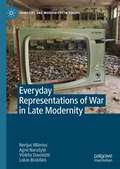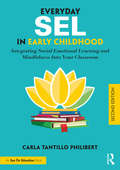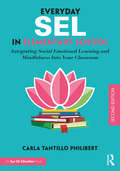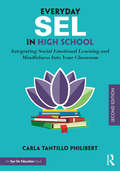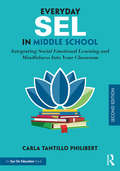- Table View
- List View
Everyday Artists: Inquiry and Creativity in the Early Childhood Classroom (Early Childhood Education)
by Dana Frantz BentleyFor the young child, art is a way of solving problems, conceptualizing the world, and creating new possibilities. In <i>Everyday Artists</i>, the author addresses the disconnect that exists between the teaching of art and the way young children actually experience art. In doing so, this book questions commonly held notions and opens up exciting new possibilities for art education in the early childhood classroom. A practicing teacher herself, Bentley uses vignettes of children’s everyday activities—from block building to clean-up to outdoor play—to help teachers identify and scaffold the genuine artistic practice of young children.
Everyday Astrology: How to Make Astrology Work for You
by Gary GoldschneiderThe bestselling author of "The Secret Language of Birthdays" returns with the definitive astrology handbook.
Everyday Bioethics: Reflections on Bioethical Choices in Daily Life (Policy, Politics, Health and Medicine Series)
by Giovanni Berlinguer"Everyday Bioethics" suggests a new perspective on the relationships between science, ethics and society. It is based upon the distinction and integration of two fields: the frontier bioethics, which examines the new development of biomedicine; and the bioethics of everyday life, which concerns all people around the world. Indeed, moral reflection on birth, human bodies, jobs, the gender and class relations, diseases and the treatment of the sick, death, the interdependence of human beings and other living creatures, has a long history, as long as that of mankind itself. The ideas and values that daily permeate the minds and behaviors of all human beings in these fields deserve the greatest attention, and are increasingly influenced by the progress of science and technology.
Everyday Creativity and the Healthy Mind: Dynamic New Paths for Self and Society (Palgrave Studies in Creativity and Culture)
by Ruth RichardsAs human beings we all have creative potential, a quality essential to human development and a vital component to healthy and happy lives. However this may often remain stifled by the choices we make, or ways in which we choose to live in our daily lives. Framed by the “Four Ps of Creativity” – product, person, process, press – this book offers an alternative understanding of the fundamentals of ordinary creativity. Ruth Richards highlights the importance of “process”, circumventing our common preoccupation with the product, or creative outcome, of creativity. By focusing instead on the creator and the creative process, she demonstrates how we may enhance our relationships with life, beauty, future possibilities, and one another. This book illustrates how our daily life styles and choices, as well as our environments, may enable and allow creativity; whereas environments not conducive to creative flow may kill creative potential. Also explored are questions of ‘normality’, beauty and nuance in creativity, as well as creative relationships.
Everyday Ethics: A Case Study Analysis
by Jean P. KirnanThis book expands the current discussion on ethics, addressing the gap between "headline" ethics cases, which are often extreme and taken from a business context, and the everyday ethical challenges that we all face in school, work, relationships, and communities. Case studies throughout demonstrate concepts and provide opportunities for readers to apply theory as they consider everyday issues such as the temptation to lie about an arrest on a job application, peer pressure to steal or drink, and the implications of "ratting out" a classmate who is cheating or a co-worker who is stealing. By including a broad array of ethical challenges, this book makes ethics more accessible to the reader. Drawing from several academic disciplines, including social psychology and organizational behavior, this book explores the personal and environmental factors that influence our ethical decision-making. The book is appropriate for ethics courses in an array of disciplines as well as anyone interested in ethical challenges.
Everyday Evils: A psychoanalytic view of evil and morality
by Coline CovingtonEveryday Evils takes a psychoanalytic look at the evils committed by "ordinary" people in different contexts – from the Nazi concentration camps to Stockholm Syndrome to the atrocities publicized by Islamic State – and presents new perspectives on how such evil deeds come about as well as the extreme ways in which we deny the existence of evil. Concepts of group behaviour, morality, trauma and forgiveness are reconsidered within a multi-disciplinary framework. The psychodynamics of dissociation, and the capacity to witness evil acts while participating in them, raise questions about the origin of morality, and about the role of the observing ego in maintaining psychic equilibrium. Coline Covington examines how we demonize the "other" and how violent actions become normalized within communities, such as during the Rwandan genocide and Polish pogroms. The recent attraction of the millenarian theocracy of the Islamic State also highlights our fascination with violence and death. Covington emphasizes that evil comes about through a variety of causes and is highly contextual. It is our capacity to acknowledge the evils we live with, witness and commit that is vital to how we manage and respond to violence within ourselves and others and in mitigating our innate destructiveness. In conclusion, the book addresses how individuals and societies come to terms with evil, along with the problematic concept of forgiveness and the restoration of good. Everyday Evils blends psychoanalytic concepts together with the disciplines of sociology, history, anthropology, philosophy, theology and studies of violence in order to develop a richer, deeper and more comprehensive understanding of evil. Intending to make the unthinkable thinkable, this book will appeal to scholars from across those disciplines, as well as psychoanalysts, psychotherapists and anyone who has ever asked the question: "How could anyone do something like that?"
Everyday Friendships
by Harry BlattererEveryday Friendship conceptualises the lived experience of intimacy in a world in which the terms and conditions of love and friendship are increasingly unclear. Drawing on writing on friendship, love, and intimacy by such thinkers as Simmel and Kracauer, Elias, Goffman, Luhmann and Honneth, the book charts the modern meaning of intimacy and the freedoms it offers, as well as the continued challenges of entrenched gendered assumptions in everyday relations of affection, trust and respect. It shows that the analysis of the 'small world' of dyads can give important clues about society, and in this case about its gendered makeup. Everyday Friendship seeks to reintegrate into sociology the study of friendship and the analysis of dyads.
Everyday Friendships: Intimacy as Freedom in a Complex World (Palgrave Macmillan Studies in Family and Intimate Life)
by H. BlattererThis book conceptualises the lived experience of intimacy in a world in which the terms and conditions of love and friendship are increasingly unclear. It shows that the analysis of the 'small world' of dyads can give important clues about society and its gendered makeup.
Everyday Games for Sensory Processing Disorder: 100 Playful Activities to Empower Children with Sensory Differences
by Barbara SherIn this new solutions-based guide, Barbara Sher has collected 100 sensory-rich games that make joyful working with the children having sensory processing disorder, autism and Asperger's. Everyday Games for Sensory Processing Disorder advocates play as the most effective approach for children with sensory processing disorder, and illustrates the many ways that play can lead to significant breakthroughs.
Everyday Heaven: Journeys Beyond the Stereotypes of Autism
by Donna WilliamsEveryday Heaven is the much-awaited fourth installment in Donna Williams' series of best-selling autobiographies about her life with autism. A humorous, riveting, roller-coaster of a book, Everyday Heaven covers the monumental nine years from the time Ian left their accidental, 'autistic marriage', to Donna's candid, funny, often bumbling explorations of sexuality and orientation, the challenge of coming to terms with the sudden deaths of those closest to her and finally knowing what life was like without the invisible cage of her 'Exposure Anxiety'. Described as enthralling, deeply moving and gripping, this book will strike a lasting chord not only with autistic readers and professionals seeking to better understand those on the autism spectrum but all of us who simply dream of daring to love deeply, to adventure and to deal triumphantly with the losses along the way.
Everyday Intuition: What Psychology, Science, and Psychics Can Teach Us About Finding and Trusting Our Inner Voice
by Elizabeth GreenwoodA captivating and insightful deep dive into the world of human intuition, exploring the power of this elusive phenomenon and how it can be harnessed to better know and trust ourselves. We rely on our intuition, even though we don’t fully understand what it is, how it works, or if we can even trust it. In this fresh, mind-opening book, Elizabeth Greenwood takes us on a sweeping investigation into the subject, exploring how, in our data-driven world, we can harness intuition in our day-to-day lives.Digging deep into her personal experience as well as insights from neuroscience, psychology, , feminist texts, psychics, and everyday people with extraordinary intuitive ability, Greenwood explores what we know about intuition—how to distinguish it from instinct, wishful thinking, anxiety, and denial; how it serves and sometimes fails us; how it impacts our dreams and unconscious behavior; and how it manifests in everything from romantic attraction to premonitions. Greenwood places a special emphasis on “women’s intuition,” and how it has been denigrated throughout history—but can offer us a more hopeful, grounded way of experiencing the world in a time of so much uncertainty.Everyday Intuition provides practical advice on tapping into our self-knowledge and learning to trust our instincts. It examines the science behind intuition, including how our brains process information, how psychedelic medicine and manifestation are opening new doors of consciousness—as well as how these helpful methods are being abused by charlatans, including some "coaches," "teachers," and social media influencers offering false promises—and how we can train ourselves to be more intuitive and ultimately enhance our daily lives.Smart, funny, sincere, and profound, this helpful guide is a modern take on one of the oldest tools we possess. It shows us how embracing intuition can lead us to our truest, most mindful selves, and to better align the lives we are living with the lives we desire.
Everyday Leadership: A Guide to Developing Your Mindset as a Leader
by Ross BlankenshipThis engaging book presents useful frameworks, key ideas, and practical techniques – all grounded in scientific research – to help you lead better on a day-to-day basis.Whether you are moving into your first leadership role or are already a leader and looking to expand your purview and skillset, this is an essential resource for understanding leadership. Recognizing that a one-size-fits-all leadership approach isn’t always possible, Everyday Leadership encourages you to develop your own leader mindset. It gives a foundational overview of what leadership is, what makes leaders effective, and how to think systematically about organizations and teams. Translating science into accessible and practical language, it also offers general guidance for those who are interested in expanding their skills and knowledge. These teachings are supported by easy-to-follow reflective questions and exercises, allowing you to put these ideas into practice and develop a leadership practice that works best for you. At a time when people need to be empowered to lead, it will encourage you to truly think about what it means to lead other people in work and in life.Providing a toolkit that covers basic theories, concepts, and practices in leadership research, this book is a go-to resource for all leaders wherever you are in your leadership journey.
Everyday Leadership: Taking Charge in the Real World
by Sandra Sherman Ahron Friedberg, M.D.Everyday Leadership examines how individuals in everyday, relatively small settings can succeed in leadership positions.The book provides tools for tackling the unique psychological and external challenges that everyday leaders face, and offers principles that they can adapt to their own situations. Dr. Ahron Friedberg, who regularly advises leaders and would-be leaders, emphasizes the social aspect of leadership, and explores how those who are new to leadership – and those in established positions – can leverage their support networks and thrive in their roles. The book follows the experience of real people who have faced leadership challenges and learned from them, demonstrating how readers can learn from these examples and apply them to their own circumstances. Guided by a practical leadership roadmap, chapters examine concepts such as vision, determination, flexibility, planning, organization, and responsibility using extensive case studies, with reflective questions and key takeaways that help the reader consider how to apply these principles to their own leadership challenges.This book is an essential read for HR professionals, executive coaches, management consultants, leadership trainers, and organizational psychologists as well as those facing leadership challenges in their profession.
Everyday Life and the Unconscious Mind: An Introduction to Psychoanalytic Concepts
by Hannah CurtisAn increasing number of people are seeking to develop an understanding of psychoanalytic concepts in order to apply them to the ordinary situations that they encounter as they go about their work, family and social lives. Some of these people are students just leaving college and going on to university, some are managers seeking to understand the dynamics of work place relationships and some are the friends or families of people who suffer with emotional distress or mental health issues. Everyday Life and the Unconscious Mind is written for students, for those who work in the care sector, or in management, and for those who love someone who is struggling emotionally. It explains and clarifies some of the concepts that address the way in which the unconscious mind works and how it seeks to manage its feelings. It includes chapters on trauma and defence mechanisms, which are to do with how we cope with events that act like a psychological blow to our self esteem or our identity.
Everyday Matters in Science and Mathematics: Studies of Complex Classroom Events
by Beth Warren Ricardo Nemirovsky Ann S. Rosebery Jesse SolomonThis book re-examines the dichotomy between the everyday and the disciplinary in mathematics and science education, and explores alternatives to this opposition from points of view grounded in the close examination of complex classroom events. It makes the case that students' everyday experience and knowledge in their entire manifold forms matter crucially in learning sciences and mathematics. The contributions of 13 research teams are organized around three themes: 1) the experiences of students in encounters with everyday matters of a discipline; 2) the concerns of curriculum designers, including teachers, as they design activities intended to focus on everyday matters of a discipline; and 3) the actions of teachers as they create classroom encounters with everyday matters of a discipline.As a whole the volume reflects the shift in the field of educational research in recent years away from formal, structural models of learning toward emphasizing its situated nature and the sociocultural bases of teaching and learning. At least two trends--increasing awareness that formal theories can be useful guides but are always partial and provisional in how they disclose classroom experiences, and the widespread availability of video and audio equipment that enables effortless recording of classroom interactions--have reoriented the field by allowing researchers and teachers to look at learning starting with complex classroom events rather than formal theories of learning. Such examinations are not meant to replace the work on general theoretical frameworks, but to ground them in actual complex events. This reorientation means that researchers and teachers can now encounter the complexity of learning and teaching as lived, human meaning-making experiences. Immersion in this complexity compels rethinking assumptions about the dichotomies that have traditionally organized the field's thinking about learning. Further, it has important implications for how the relationship between theory and practice in understanding teaching and learning is viewed.Everyday Matters in Science and Mathematics: Studies of Complex Classroom Events is an important resource for researchers, teacher educators, and graduate students in mathematics and science education, and a strong supplemental text for courses in these areas and also in cognition and instruction and instructional design.
Everyday Memory
by Svein Magnussen Tore HelstrupThis book presents an authoritative overview of memory in everyday contexts. Written by an expert team of international authors, it gathers together research on some of the more neglected but revealing areas of memory, to provide a comprehensive overview of remembering in real life situations. Contributions from leading experts deal with a variety of important questions concerning everyday memory, from under-researched areas such as memory for odours, to more well known areas, like collective memory. Topics covered also include: Beliefs about memory and the metaphors used to discuss memory The relation between self-referent beliefs and actual memory performance The development of autobiographical memory. Everyday Memory summarises current knowledge and presents new interpretations and hypotheses to be explored by future research. It discusses aspects of human memory which are frequently ignored or dealt with only very briefly by ordinary textbooks and as a result will have a broad appeal for researchers and students.
Everyday Music Listening: Absorption, Dissociation and Trancing
by Ruth HerbertIn what ways does listening to music shape everyday perception? Is music particularly effective in promoting shifts in consciousness? Is there any difference perceptually between contemplating one's surroundings and experiencing a work of art? Everyday Music Listening is the first book to focus in depth on the detailed nature of music listening episodes as lived mental experiences. Ruth Herbert uses new empirical data to explore the psychological processes involved in everyday music listening scenarios, charting interactions between music, perceiver and environment in a diverse range of real-world contexts. Findings are integrated with insights from a broad range of literature, including consciousness studies and research into altered states of consciousness, as well as ideas from ethology and evolutionary psychology, suggesting that a psychobiological capacity for trancing is linked to the origins of making and receiving of art. The term 'trance' is not generally associated with music listening outside ethnomusicological studies of strong experiences, yet 'hypnotic-like' involvements in daily life have long been recognized by hypnotherapy researchers. The author argues that multiply distributed attention - prevalent in much contemporary listening- does not necessarily indicate superficial engagement. Music emerges as a particularly effective mediator of experience. Absorption and dissociation, as manifestations of trancing, are self-regulatory processes, often operating at the level of unconscious awareness, that support individuals' perceptions of psychological health. This fascinating study brings together research and theory from a wide range of fields to provide a new framework for understanding the phenomenology of music listening in a way that will appeal to both specialist academic audiences and a broad general readership.
Everyday Mysteries: A Handbook of Existential Psychotherapy
by Emmy van DeurzenThis book provides an in-depth introduction to existential psychotherapy. Presenting a philosophical alternative to other forms of psychological treatment, it emphasises the problems of living and the human dilemmas that are often neglected by practitioners who focus on personal psychopathology. Emmy van Deurzen defines the philosophical ideas that underpin existential psychotherapy, summarising the contributions made by Kierkegaard, Nietzsche, Heidegger and Sartre among others. She proposes a systemic and practical method of existential psychotherapy, illustrated with detailed case material. This expanded and updated second edition includes new chapters on the contributions of Max Scheler, Albert Camus, Gabriel Marcel and Emmanuel Levinas, as well as on feminist contributors such as Simone de Beauvoir and Hannah Arendt. In addition a new extended case discussion illustrates the approach in practice. Everyday Mysteries offers a fresh perspective for anyone training in psychotherapy, counselling, psychology or psychiatry. Those already established in practice will find this a stimulating source of ideas about everyday life and the mysteries of human experience, which will throw new light on old issues.
Everyday Playfulness: A New Approach to Children’s Play and Adult Responses to It
by Stuart LesterSeeing play as an important and vital element of life for children and adults alike, this book addresses the ways in which practitioners take account of and act responsibly with moments of children's play and playfulness.Working with the Playwork Principles, the book draws on alternative concepts to traditional approaches, including ideas from materialist and posthuman philosophy and human geography, to explore playing as process rather than product. Topics covered include play and wellbeing, play and space, and the micro-politics of playing, critical cartography and adult account-ability and response-ability. It concludes by considering the implications for professional practice and offering ways that professionals can develop practices that maintain and co-create favourable conditions in which children's play can flourish.
Everyday Representations of War in Late Modernity (Identities and Modernities in Europe)
by Violeta Davoliūtė Nerijus Milerius Agnė Narušytė Lukas BrašiškisThis book analyses photographic and cinematographic representations of war and its memorialisation rituals in the period of late modernity from the perspectives of cultural sociology, philosophy, art theory and film studies. It reveals how the experience of war trauma takes root in everydayness and shows how artists try to question the ‘normality’ of the everyday, to actualise the memory of war trauma, to rethink the contrasting experiences of the time of war and everydayness, and to oppose the imposed historical narratives. The new representations are analysed by developing theories of war as a ‘magic spectacle’, also by using such concepts as spectres, triumph and trauma, collective social catastrophes, forensic architecture and others.
Everyday SEL in Early Childhood: Integrating Social Emotional Learning and Mindfulness Into Your Classroom
by Carla Tantillo PhilibertWith this bestselling book from educational consultant Carla Tantillo Philibert, you’ll gain practical strategies for teaching Social Emotional Learning (SEL), mindfulness, and well-being to help improve the human connection between you and your students. You’ll find out how to lead students through mindfulness activities, simple yoga poses, and breath-work techniques. Topics include mindful practices, well-being strategies to combat stress and anxiety, giving your students the space to understand their emotions and strengthen peer-to-peer communication, developing the foremost and essential SEL competencies, and engaging in experiential activities to strengthen SEL skills. The new edition reflects the latest CASEL guidelines and includes updated activities, as well as a brand-new directory of terms, and an intentional focus on educators’ and students’ socio-emotional well-being. Perfect for early childhood educators at any level of experience, the book will help you develop positive youth identity and promote connectedness so students can deal successfully with life’s stressors beyond school doors.
Everyday SEL in Elementary School: Integrating Social Emotional Learning and Mindfulness Into Your Classroom
by Carla Tantillo PhilibertWith this bestselling book from educational consultant Carla Tantillo Philibert, you’ll gain practical strategies for teaching Social Emotional Learning (SEL), mindfulness, and well-being to help improve the human connection between you and your students. You’ll find out how to lead students through mindfulness activities, simple yoga poses, and breath-work techniques. Topics include mindful practices, well-being strategies to combat stress and anxiety, giving your students the space to understand their emotions and strengthen peer-to-peer communication, developing the foremost and essential SEL competencies, and engaging in experiential activities to strengthen SEL skills. The new edition reflects the latest CASEL guidelines and includes updated activities, as well as a brand-new directory of terms, and an intentional focus on educators’ and students’ socio-emotional well-being. Perfect for elementary school educators at any level of experience, the book will help you develop positive youth identity and promote connectedness so students can deal successfully with life’s stressors beyond school doors.
Everyday SEL in High School: Integrating Social Emotional Learning and Mindfulness Into Your Classroom
by Carla Tantillo PhilibertWith this bestselling book from educational consultant Carla Tantillo Philibert, you’ll gain practical strategies for teaching Social Emotional Learning (SEL), mindfulness, and well-being to help improve the human connection between you and your students. You’ll find out how to lead students through mindfulness activities, simple yoga poses, and breath-work techniques. Topics include mindful practices, well-being strategies to combat stress and anxiety, giving your students the space to understand their emotions and strengthen peer-to-peer communication, developing the foremost and essential SEL competencies, and engaging in experiential activities to strengthen SEL skills. The new edition reflects the latest CASEL guidelines and includes updated activities, as well as a brand-new directory of terms, and an intentional focus on educators’ and students’ socio-emotional well-being. Perfect for high school educators at any level of experience, the book will help you develop positive youth identity and promote connectedness so students can deal successfully with life’s stressors beyond school doors.
Everyday SEL in Middle School: Integrating Social Emotional Learning and Mindfulness Into Your Classroom
by Carla Tantillo PhilibertWith this bestselling book from educational consultant Carla Tantillo Philibert, you’ll gain practical strategies for teaching Social Emotional Learning (SEL), mindfulness, and well-being to help improve the human connection between you and your students. You’ll find out how to lead students through mindfulness activities, simple yoga poses, and breath-work techniques. Topics include mindful practices, well-being strategies to combat stress and anxiety, giving your students the space to understand their emotions and strengthen peer-to-peer communication, developing the foremost and essential SEL competencies, and engaging in experiential activities to strengthen SEL skills. The new edition reflects the latest CASEL guidelines and includes updated activities, as well as a brand-new directory of terms, and an intentional focus on educators’ and students’ socio-emotional well-being. Perfect for middle school educators at any level of experience, the book will help you develop positive youth identity and promote connectedness so students can deal successfully with life’s stressors beyond school doors.
